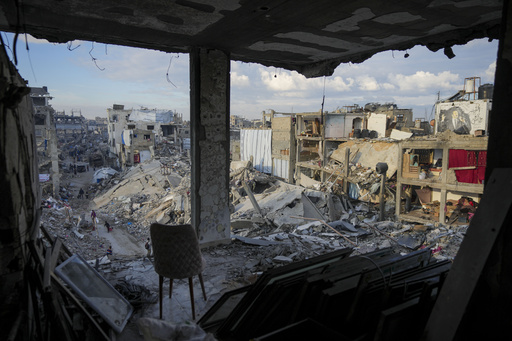
CAIRO — Israel has initiated steps aimed at the potential relocation of Palestinians from Gaza, even as global opposition to President Trump’s controversial proposal remains strong. Officials indicate that Egypt has been active in diplomatic efforts to counter the plan, highlighting concerns that such actions would jeopardize its long-standing peace agreement with Israel.
The Trump administration has toned down certain elements of its proposal after facing widespread backlash, suggesting that the planned relocation of Palestinians would be temporary. However, U.S. officials have been vague regarding specifics about execution timelines or methodologies for the plan.
In a recent social media update, Trump claimed that Israel would hand over governance of Gaza to the United States following the conflict and that military assistance would not be necessary for the redevelopment efforts.
Palestinian representatives have firmly rejected Trump’s idea, with fears that any relocation would prevent their return. Egypt has raised warnings that such a displacement would lead to further instability throughout the region, threatening the peace treaty with Israel—a critical aspect of regional stability and American geopolitical interests for many years.
Additionally, Saudi Arabia, a vital ally to the U.S., has opposed any mass relocation of Palestinians, insisting that normalization efforts with Israel will not proceed without the establishment of a Palestinian state inclusive of Gaza.
While Trump and Israeli officials have framed the proposed relocation as a matter of choice, Palestinians across the spectrum insist they will not abandon their homeland. The lack of clarity regarding the consequences for those who refuse to leave has raised further concerns, with Human Rights Watch among other organizations asserting that such a plan could be categorized as “ethnic cleansing,” which pertains to the forced removal of a specific ethnic group from particular territories.
On Thursday, Defense Minister Israel Katz stated that measures are being taken to enable the departure of a significant number of Palestinians through land, air, and sea routes; however, there hasn’t been any visible progress on the ground indicating such preparations.
In the background, Egyptian President Abdel-Fattah el-Sissi has remained silent publicly about Trump’s alarming proposal, which suggests relocating a major portion of Gaza’s 2.3 million Palestinians and handing control over the territory to the U.S. Israel’s ongoing military campaign against Hamas has left considerable portions of Gaza in devastation, although a shaky ceasefire came into effect last month.
Nonetheless, Egyptian officials, requesting anonymity due to the sensitivity of the discussions, have emphasized Cairo’s refusal to back any initiatives proposing the expulsion of Palestinians, stating that the peace deal established with Israel is under threat. This warning has reached various U.S. government branches, including the Pentagon and Congress, as well as Western European allies such as the UK, France, and Germany.
In an official statement, the Egyptian government denounced any efforts to displace Palestinians as a clear breach of international law. A Western diplomat in Cairo, also preferring anonymity, confirmed that Egypt had communicated its strong opposition firmly, emphasizing that the plan poses a risk to its national security.
Egypt has previously rejected similar proposals made by the Biden administration and European nations early in the conflict that originated with Hamas’ incursion into southern Israel on October 7, 2023. While prior discussions remained informal, Trump’s proposition was publicly declared during a press conference alongside Israeli Prime Minister Netanyahu.
Hamas, the governing authority in most of Gaza, has condemned Trump’s proposal on multiple occasions. It warned that any U.S. administration in Gaza would be regarded as an occupation and, as a result, could lead to armed resistance from the group. It remains uncertain what effects, if any, these objections might have on the anticipated exchange of Israeli hostages and Palestinian detainees scheduled for Saturday.
Trump initially suggested a “permanent” resettlement of the majority of Gaza’s inhabitants while proposing that the U.S. oversee the reconstruction of the region, envisioning it as a premier destination in the Middle East. Subsequently, U.S. officials seemed to retract some of those ideas, stating the relocation would be temporary and indicating no definitive commitment to deploying American troops or financing reconstruction efforts.
Egyptian officials maintain that resettling Palestinians is unnecessary for recovery in Gaza, aligning their stance with the goal of achieving a Palestinian state encompassing Gaza, the West Bank, and East Jerusalem—territories Israel occupied in the 1967 conflict.
In stark contrast, the Israeli government opposes the notion of a Palestinian state and asserts that it will continue to enforce security control over Gaza and the West Bank indefinitely. Israel’s annexation of East Jerusalem remains contested by much of the international community, which does not recognize the city’s status as the capital of Israel.
Recently, Egypt facilitated a meeting with senior diplomats from Jordan, Saudi Arabia, Qatar, and the United Arab Emirates—nations that supported the Trump-brokered Abraham Accords in 2020. All participating Arab nations rejected the notion of relocating Palestinians from Gaza or the West Bank.
In a recent editorial, Egypt’s primary state-run publication, Al-Ahram, cautioned that the stability of Arab nations, national unity, and territorial integrity are facing critical challenges.
In response to Katz’s commentary through social platforms, he suggested that European nations that had previously criticized Israel’s military actions should take in the Palestinians. Spain’s Foreign Minister rejected such remarks firmly, asserting, “Gaza is the land of Gazans,” while a spokesperson for Ireland’s foreign affairs echoed sentiments that the core focus should be ensuring the safety and return of Palestinians to their homeland, describing contrary remarks as unproductive.

